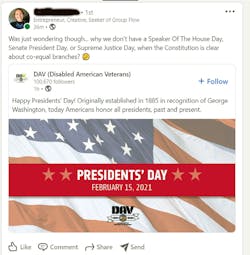Communication is about choices, intention, layers, and nuance. This is true for the communications of a business too and it underscores the importance for businesses to have a communications plan in place. One overlooked outreach tactic concerns business communications about holidays and observances communication.
As consumers, we are quite familiar with retailers using holidays to communicate. Holidays offer an opportunity to create emotional connection with customers, and to stay in touch, via website banners, social media, electronic newsletters, and even old-fashioned direct mail. They offer the chance to say “hello” as a touch point, update company status, or to hawk a sale. But, the benefits of holiday communication aren’t exclusively for retail or consumer businesses; B2B companies can leverage holidays to extend their communication outreach too.
Observances and acknowledgements of holidays should not be just a quick graphic or meme dashed off by an intern and slapped up on Facebook; that is a recipe for a communications crisis, even among B2B companies. Holidays and observances should be strategically mapped out as communication touch points within a larger communication plan. What are the goals of the overall communication plan? How will holidays or observances fit in? Are they merely to communicate days on which the company is closed (e.g., Christmas), or used as a tool to tout a company value (e.g., Earth Day)? Or are these communications leveraged to engage a larger audience?
However, some holidays are “safer’ for a B2B company to acknowledge, such as: New Year’s Day, Independence Day, or President’s Day. Others are fraught with potential misinterpretations and may become a source of controversy. In this age of diversity and inclusion awareness, controversial choices may include acknowledging Columbus Day or even not acknowledging days of cultural observance such as Martin Luther King Day.
Holiday acknowledgements can also be utilized as a strategic advantage to convey a company’s culture during holidays like the Lunar New Year, Earth Day, or Cinco de Mayo, provided it’s appropriate to the business. Other observances -- like May 4th (a Star Wars ode) or National Popcorn Day -- can offer an opportunity to extend the brand’s identity or to make a play on the product base.
An example of how communication about a holiday or an observance might be used to leverage a larger B2B audience could be a chemical company highlighting the contributions of Black chemists on social media during Black History Month (February.) Such an effort would showcase the company’s commitment to diversity for potential customers as well as potential employees. Even within this communication choice, there are options - with repercussions. If the company lacks diversity with current employees - the spotlight might be historical breakthroughs of Black chemists, to denote respect and willingness to be inclusive. If the company has Black chemistry staff, then the company might choose to showcase a mix of their own employees (or their achievements) and historical figures (or their achievements.)
But, if the company doesn’t make other inclusionary communication choices (spotlighting women in chemistry or Latinx successes in chemistry), the Black History Month effort may be perceived as less than sincere. Still, if the chemical company is Black-owned or its leadership team is Black, then the choice to participate exclusively in Black History Month is less complicated as well as less likely to be misinterpreted by either potential customers or employees.
Communication planning requires a deep understanding of the company’s values, priorities, and customers. A communication plan leverages the relationships between audiences, messages, channels, activities, and materials available to the business in service to the brand. No part of the communication plan, including holiday or observance announcements, should be slap-dash or ill-considered. The axiom, “An ounce of prevention is worth a pound of cure”, is never truer than in business communications. Preemptively planning how holidays and observances will be handled is an essential part of a business communication plan and keeps communications from triggering a crisis plan.
Alexandria Trusov is the Global Marketing Manager at Alpha Resources and a B2B marketing consultant to manufacturers and other B2B companies. Contact her at [email protected] or visit www.truinsightsconsulting.com.
About the Author
Alexandria Trusov
Global Marketing Director
Alexandria Trusov is the Global Marketing Director at Alpha Resources and a B2B marketing consultant to manufacturers and other B2B companies. Contact her at [email protected] or visit www.truinsightsconsulting.com.

